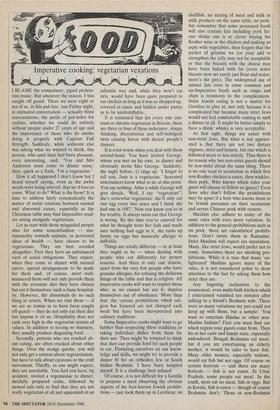Imperative cooking: vegetarian vexations
•
I BLAME the compulsory, piped proleta- rian music. But whatever the reason, I was caught off guard. There we were eight or ten of us, in this pub late one Friday night, in animated conversation — actually three conversations; the perils of pot-holes for cyclists, whether we could do entirely without people under 27 years of age and the importance of those who do smoke doing it properly with Capstan Full Strength. Suddenly, while someone else was asking what we wanted to drink, this person, who until then had been pleasant, even interesting, said, 'You and Mrs Anderson must come to dinner soon,' then, quick as a flash, 'I'm a vegetarian.'
How it all happened I don't know but I heard myself saying, even as the awful words were being uttered, that we'd love to come. What to do? What is the form? It is time to address fairly systematically the matter of social relations between normal and abnormal eaters, especially as the Christmas table may find Imperative read- ers sitting alongside vegetarians.
Let us start with those misguided people who for some reason/fashion — sen- timentality towards animals, or perverted ideas of health — have chosen to be vegetarians. They are best avoided altogether. First they have an unbalanced view of social obligations. They expect, when they come to dinner with normal eaters, special arrangements to be made for them and, of course, most well- mannered hosts will not only provide them with the eccentric diet they have chosen but eat it themselves: such is basic hospital- ity. However, the abnormals do no such thing in return. When we visit them — if we are so remiss as to have been caught off-guard — they do not only eat their diet but impose it on us. Hospitality does not rank very high in the vegetarian system of values. In addition to having no manners, they usually produce disgusting food.
Secondly, persons who are cracked ab- out eating, are often cracked about other things. Over the stodgy quiche, you will not only get a sermon about vegetarianism, but have to talk about caravans or the craft movement. Thirdly, as one might expect, they are unreliable. You find you have, by accident, invited a vegemaniac to dinner, dutifully prepared crabs, followed by stewed eels only to find that they are not really vegetarian at all just squeamish in an infantile way and, while they won't eat eels, would have been quite prepared to eat chicken as long as it was so chopped up, covered in sauce and hidden under pastry as to be unidentifiable.
It is estimated that for every one con- stant or chronic vegetarian in Britain, there are three or four of these indecisive, sloppy thinking, discourteous and self-indulgent twits causing havoc with decent people's dinners.
It is even worse when you deal with them second-hand. You have invited George, whom you met on his own, to dinner and obviously invite Mrs George. Suddenly, the night before, G rings up: 'I forgot to tell you, Jane is a vegetarian.' Seasoned entertainers know what to do at this point. You say nothing. After a while George will give details, 'Well, I say "vegetarian"; she's somewhat vegetarian: she'll only eat one egg every two years and I think she had one in 1987.' Now you know you're in for trouble. It always turns out that George is wrong. By the time you've catered for what he thought were her fads and made sure nothing had eggs in it, she turns up firmly on eggs but manically allergic to daffodils.
Things are totally different — or at least they ought to be — when dealing with people who eat differently for proper reasons. And there is only one reason, apart from the very few people who have genuine allergies, for refusing the delicious things of the table and that is religion. All Imperative cooks will want to respect those who, as we cannot but see it, deprive themselves out of obedience. More than that, the various prohibitions which reli- gion has fostered are not changed each week but have been incorporated into culinary traditions.
Some Imperative cooks might want to go further than respecting these traditions or taking individual dishes from them for their use. They might be tempted to think that they can provide food for such people to eat. Flattering ourselves on our know- ledge and skills, we might try to provide a dinner fit for an orthodox Jew or South Indian Brahmin. I have been tempted myself. It is a challenge best refused.
Of course, it is not difficult for a Gentile to prepare a meal observing the obvious aspects of the best-known Jewish prohibi- tions — just look them up in Leviticus; no shellfish, no mixing of meat and milk or milk products on the same table, no pork. but remember that some processed foods will also contain fats including pork fat: one thinks one is so clever buying the Kosher wine or the chicken and making an aspic with vegetables, then forgets that the packet of gelatine we (or you) add to strengthen the jelly may not be acceptable or that the biscuits with the cheese may have been baked with fat (even water biscuits now are rarely just flour and water; more's the pity). The widespread use of animal fats even in some common and un-Imperative foods such as crisps and chips is testimony to the complications. Strict Jewish eating is not a matter for Gentiles to play at, not only because it is complicated but because many strict Jews would not feel comfortable coming to such a dinner at all. It might be better simply to have a drink: whisky is very acceptable.
At first sight, things are easier with non-strict Jews. But what is not appreci- ated is that there are not two dietary regimes, strict and lenient, but one which is followed more or less strictly. Thus there is no reason why two non-strict guests should be non-strict about the same thing. There is no one road to secularism in which first non-Kosher chicken is eaten, then winkles, then pork. Who knows which rules your guest will choose to follow or ignore? Even Jews who don't follow the prohibitions may be upset if a host who knows them to be Jewish presumes on their secularism and serves Chinese pork with oysters.
Muslims also adhere to many of the same rules with even more variation. In addition to the general prohibitions such as on pork, there are calendarical prohibi- tions. Don't invite them in Ramadan. Strict Muslims will expect sex separation. Many, like strict Jews, would prefer not to come. Sometimes there are smoking pro- hibitions. While it is true that many 'en- lightened' Muslims ignore many of the rules, it is not considered polite to draw attention to the fact by asking them how strict they are.
Any lingering inclination to the ecumenical, even multi-faith kitchen which I entertained vanished ten minutes after talking to a friend's Brahmin wife. There were so many variations my pen could not keep up with them, but a sample: 'You want to entertain Hindus or other non- Muslim Indians? First you must find out which region your guests come from. Then his or her caste and family state, especially widowhood. Bengali Brahmins eat meat, but if you are entertaining an elderly mother, it would be safer to have fish. Many older women, especially widows, would eat fish but not eggs. Of course on certain festivals — and there are many festivals — fish is not eaten. In Uttar Pradesh, some people eat meat. In the south, most eat no meat, fish or eggs. But in Kerala, fish is eaten — though of course Brahmins don't. Those in non-Brahmin castes who eat meat do not eat beef but Untouchables may eat beef.'
It gets more tricky. As I recall, eating vessels are separated according to func- tion: a special vessel reserved for milk.
Always eat with the right hand. Salt always goes on the top left-hand corner of the plate or banana leaf. Water must be placed on the left-hand side and drunk with the left hand (except in the north).
And apparently it's terribly off to touch another chap's plate with the serving spoon. Cooked and uncooked foods are separate and you wash your hands between serving them. Women do not eat with men.
Generally, in India, at least, the rules are kept. 'It is possible,' she conceded, 'that some people might eat a cake made with eggs if it did not smell of eggs.'
Strict Brahmins might also prefer not to come. They would want to be satisfied that we had both bathed before we cooked and Mrs A, while she washes scrupulously, has a thing about immersion. And it's not just bathing: there's something I swear I did not mis-hear about the importance of cooking in wet clothes. And no booze and no smoking.
Christians' dietary rules are rather diffe- rent in several ways. They abstain not because certain foods are unclean but the reverse — to deprive themselves of good things. And, partly inconsequence, break- ing abstinence and fasting rules is justified if a higher virtue such as consideration for others is threatened. Thus even before the Catholic reforms, Christian guests were bidden to eat meat if a host unwittingly offered it on, for example, a Friday. Since the reforms, all is chaos. Now Fridays and various other days and seasons such as Lent are still days of abstinence or fasting but the faithful are free to choose how they keep them which, predictably, appears to be hardly at all. A host entertaining a serious Christian should, though, err on the safe side and expect some abstinence in Lent, perhaps from drink, fasting absti- nence at least on Ash Wednesday and Good Friday. It would be as well not to press guests to come in Holy Week and not to ply weekend guests with breakfasts before they slip off to Mass. If he were entertaining Orthodox Christians, much more care would need to be taken.
The upshot is that although religious 'vegetarianism' is not to be sullied by association with loony vegemania, in prac- tice, the same problems arise when enter- taining the adherents of both. . . . Strict ones are best not invited and the unstrict ones cause difficulties because you don't know which habits they still keep.
Oh! And what shall Mrs A and I do about our predicament, about the invita- tion rashly accepted? What Imperative cooks always do when they are offered bad food: eat as little as possible, be charming, and have a second dinner waiting when we return home.
Digby Anderson











































































































 Previous page
Previous page